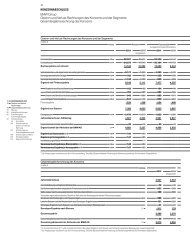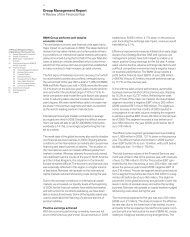Global Compact Case Study 2002 - BMW Group
Global Compact Case Study 2002 - BMW Group
Global Compact Case Study 2002 - BMW Group
Create successful ePaper yourself
Turn your PDF publications into a flip-book with our unique Google optimized e-Paper software.
<strong>BMW</strong> CleanEnergy Project.<br />
<strong>Global</strong> <strong>Compact</strong> <strong>Case</strong> <strong>Study</strong> <strong>2002</strong>.<br />
For these reasons, one objective has become consistently ever more important<br />
for the <strong>BMW</strong> <strong>Group</strong> as an automobile manufacturer: to abandon the<br />
consumption of finite energy sources, that means to switch to sustainable forms<br />
of energy and to reduce drastically CO 2 -emissions.<br />
The realization of this objective will call for an enormous economic, strategic and<br />
political strength that can only be mastered by a broad-based social alliance. This<br />
example of best practice for the United Nations <strong>Global</strong> <strong>Compact</strong> Learning Forum<br />
website shall be seen as another small step towards this alliance.<br />
What triggered the ”CleanEnergy Project”?<br />
Considering the abovementioned finite nature of fossil fuel resources and the<br />
aggravation of the global climate situation, the <strong>BMW</strong> <strong>Group</strong> started as early as<br />
the 70’s to think about how mobility (as a basic human need and a prerequisite of<br />
prosperity) can be sustainably provided in the future. This has led to a level of<br />
expertise that, in alignment with <strong>BMW</strong>’s reputation as a driver of innovation,<br />
culminated in the ”<strong>BMW</strong> CleanEnergy Project”.<br />
For the <strong>BMW</strong> <strong>Group</strong>, ”CleanEnergy” means closing the loop for zero CO 2<br />
emissions. The technical process for this is: water to hydrogen and back to water.<br />
When used in vehicles, hydrogen is converted back into vapour and returned to<br />
the atmosphere. One of the most important challenges will be the production of<br />
hydrogen from renewable resources such as wind, solar or hydro energy, this will<br />
transform our current economic system that is based on ”once-off consumption”<br />
of resources into one based on their reuse. At the <strong>BMW</strong> <strong>Group</strong>, using the<br />
detailed ”well to wheel” analysis process, we can ensure that we are not just<br />
transferring emissions from fuel consumption stage to fuel production stage. As<br />
we understand the CleanEnergy-System we feel responsible to ensure the<br />
implementation of production, distribution and application of hydrogen based on<br />
renewable energies.<br />
In addition to the obvious effect of strengthening the <strong>BMW</strong> brand in a highly<br />
competitive market, there is another side effect to this development: the <strong>BMW</strong><br />
<strong>Group</strong> prepares itself for internal and external requirements expected to be even<br />
more stringent than current ones: e.g. the Kyoto Protocol 1997, the Association<br />
of European Automobile Manufacturers (ACEA) CO 2 self-commitment to the<br />
European Commission or the California Zero Emission Vehicle Legislation.<br />
For more information on the background of these developments please refer to<br />
<strong>BMW</strong> <strong>Group</strong>’s environmental policy at www.bmwgroup.com/responsibility.<br />
<strong>BMW</strong> <strong>Group</strong>


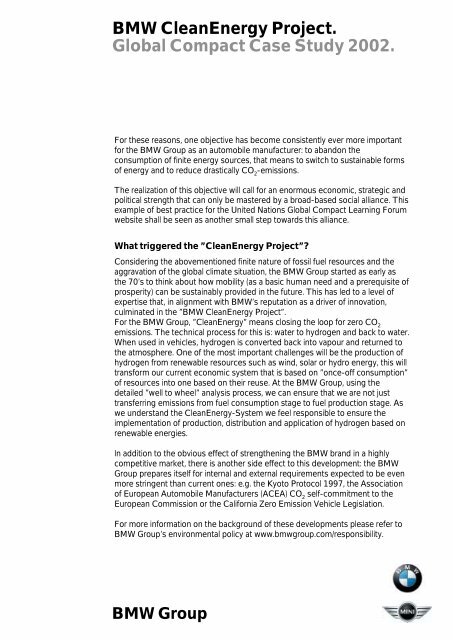
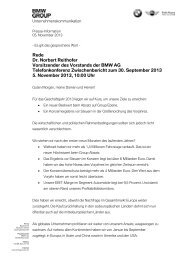
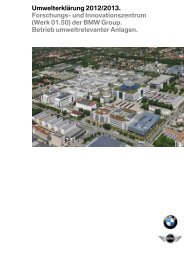
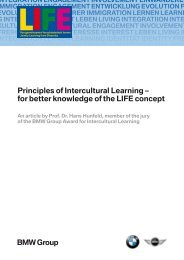
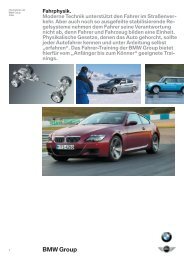
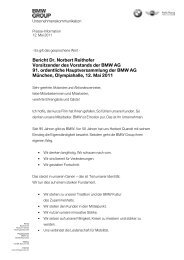
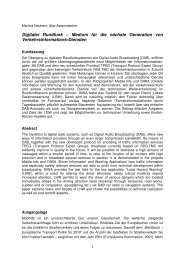
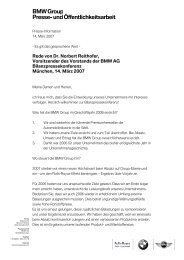
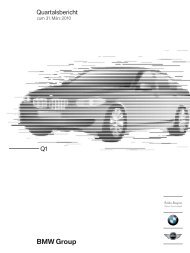
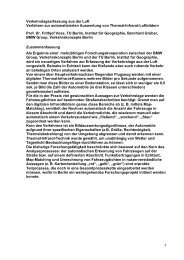
![Vollständiger Bericht [PDF] - BMW Group](https://img.yumpu.com/20706531/1/190x238/vollstandiger-bericht-pdf-bmw-group.jpg?quality=85)



